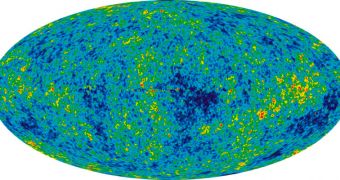Chinese officials announce that the Asian nation will soon begin its own project to hunt down dark energy, the elusive component that makes up more than three quarters of the Universe. The initiative is now only a project on paper, but a test telescope will be built soon enough.
The project is called Tianlai, which is Chinese for “Sound of Heaven.” This is an apt title for an endeavor that is notorious throughout the international scientific community for its complexity.
Dark energy cannot be observed directly. Similar to dark matter, its effects can only be noticed through interactions with normal matter. Unlike dark matter, which acts through the force of gravity, dark energy is driving the ever-accelerating expansion of the Cosmos.
Observations conducted over the past decades have revealed that galaxies are flying away from each other, while at the same time converging into clusters and superclusters. The rate of this expansion is getting faster and faster, investigations have also revealed.
However, the only way to know for sure that dark energy exists – and fulfills the role experts attribute to it – is to conduct direct observations, says National Astronomical Observatories of China (NAOC) cosmologist Chen Xuelei, the leader of the Tianlai project.
China plans to build an array of telescopes capable of mapping neutral hydrogen in the Universe. The main problem with this is that the chemical can be observed only at a wavelength of 21 centimeters.
This wavelength is heavily contaminated with signals originating from our own galaxy, the Milky Way, so separating them from the cosmic “noise” is a primary task. In order to complete it, Chinese experts will have to construct tremendously precise radio telescopes.
“Many colleagues have doubts about whether it will ever work,” Chen says, quoted by Daily Galaxy.
But the Chinese astronomers are not alone in their endeavor. Colleagues from the United States, France and Canada are also involved in the project. The construction of a prototype cylinder radio telescope is already about to begin.
Several years of experiments will then help determine whether dark energy can be observed at all. If that is the case, then China will construct a wider network of similar observatories that will later map the extent of neural hydrogen in the Universe in 3D.
Discovering dark matter and dark energy are among the main objectives in science today. Finding them would prove numerous theories, while at the same time condemning others to oblivion.
The issue here is that these two concepts were only proposed theoretically, to explain some occurrences that cannot be accounted for otherwise. If neither is found, then it's back to the drawing board for astrophysicists.

 14 DAY TRIAL //
14 DAY TRIAL //